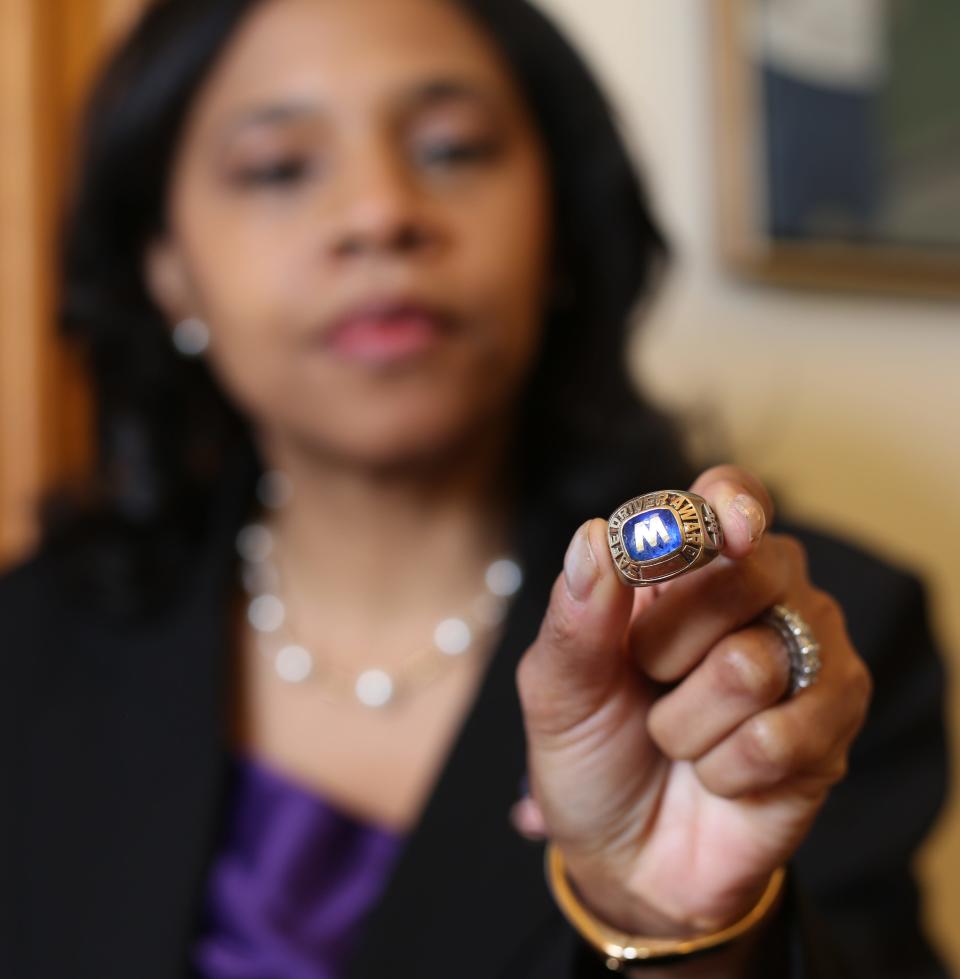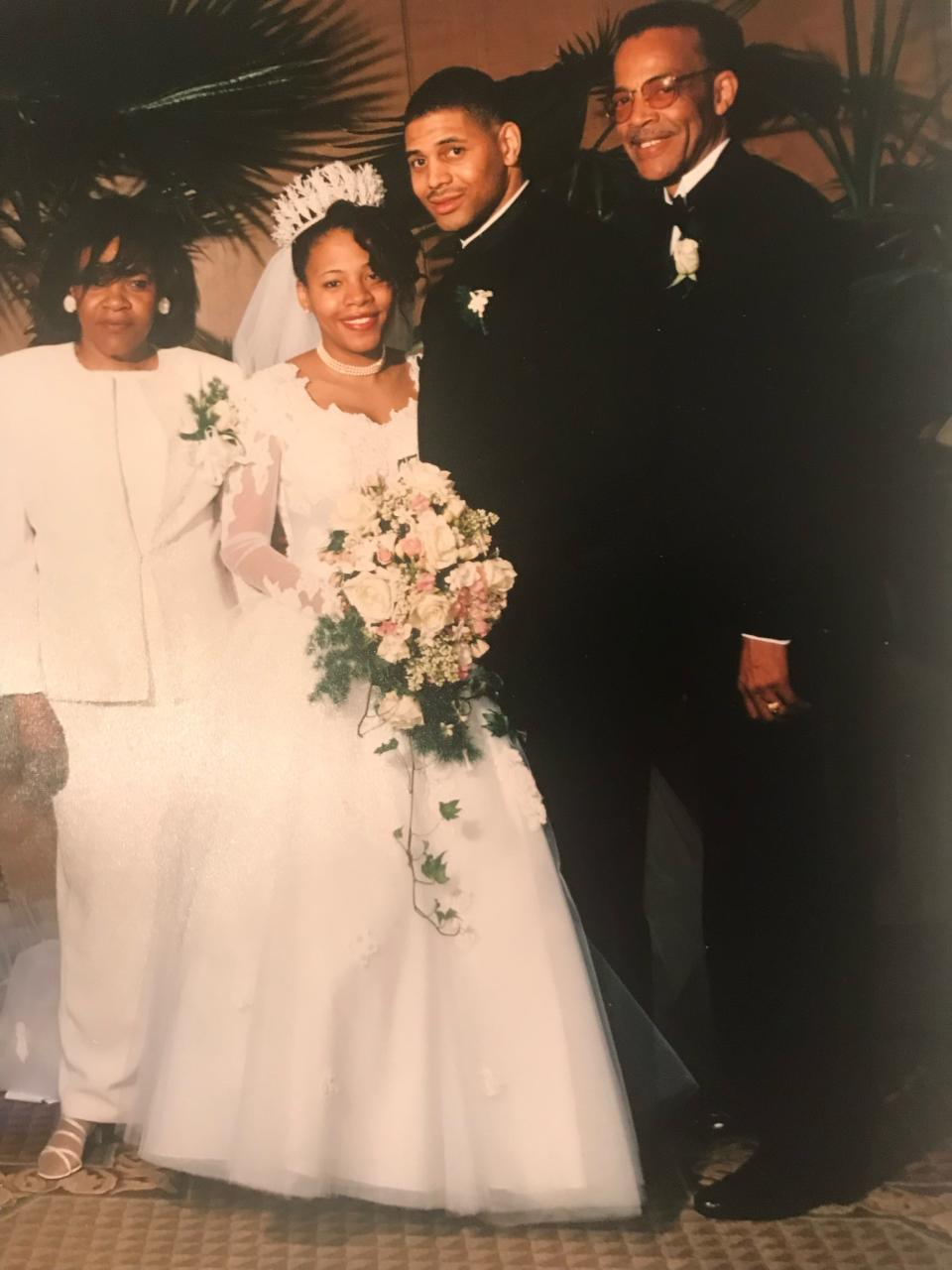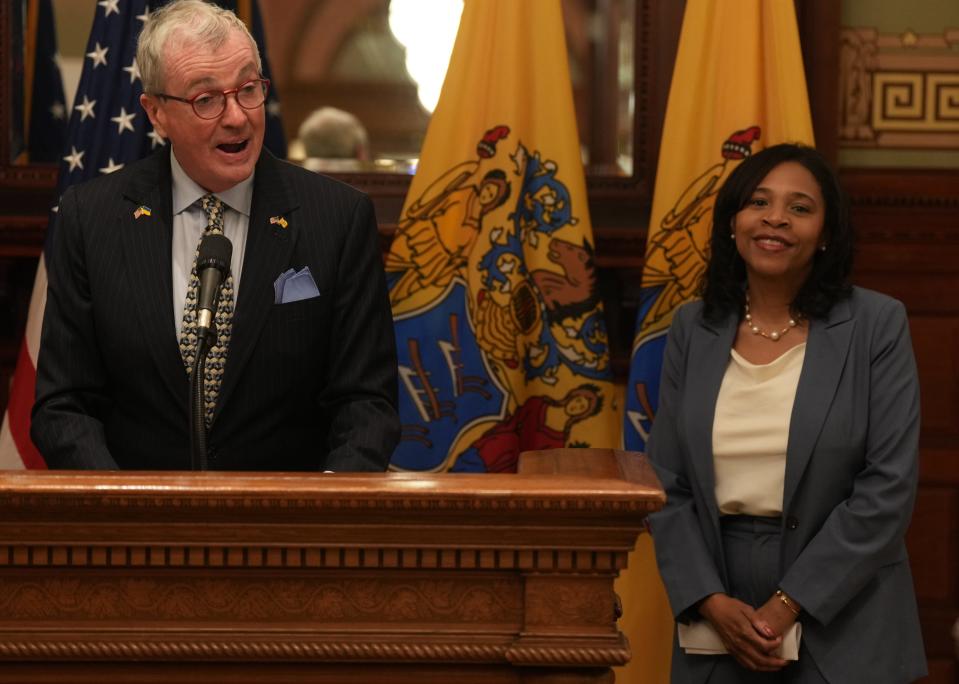This child of transit workers reached the Ivy League — and then the NJ statehouse
Tahesha Way is Ivy League-educated, holds multiple degrees and has an outstanding resume that has led to her meteoric rise to the highest levels of New Jersey government as both secretary of state and now lieutenant governor.
But the education that put her on a career path as a public servant began when she was Tahesha Wright, a child riding the bus on her father’s route in the Bronx when the family couldn’t afford day care, attending union meetings her father led as a shop steward, and hearing stories about her mother buying lunches for homeless people she encountered during her shifts as a subway token clerk.
Public service was the Wright family business. But not in the grand halls of statehouses.
It was on the ground level — or literally below ground level — of a government agency where thousands of working men and women crank the creaking cogs of government so it functions for the people.
Story continues after photo gallery
Way’s parents dedicated a combined 50 years to the Metropolitan Transportation Authority, serving the commuters of New York City — and setting an example for their daughter about what it means to be a public servant.
“The core of who I am is my parents,” Way told NorthJersey.com in a recent interview in her Trenton Statehouse office.
“The moment they put on their uniform, I just saw the pride that went into the work, into dedication,” she said.
“Oftentimes, people feel that you have to have a title of some sort, governmentally, to be a true public servant," Way said. "But for me, a regular person — my mother and father — they knew that they had to work at it with all their heart, with compassion, empathy for the public and also just wanting to ensure they had good service for the commuter.”
Way wasn’t a household name in New Jersey, even in some political circles, before being named to the second-highest role in the executive branch last year when former Lt. Gov. Sheila Oliver died suddenly in August.

But in announcing Way as Oliver’s successor, Gov. Phil Murphy made sure to mention she was a “proven public servant” whose “hard work and perseverance” were instilled by her parents.
“Over the course of her career, Tahesha has worked day and night to support the millions of New Jerseyans who share her parents’ story,” Murphy said at the announcement in September 2023, “our neighbors who work long hours, every day, to move our state forward and who ask for nothing more than a fair shake.”
Transit jobs opened doors of opportunity
To understand Way, 52, and how she ascended to lieutenant governor after a political career that began in “obscurity,” as The Record put it 15 years ago, one must go back to her roots in the world of transportation.
Way’s parents, Robert and Rosa Wright, were from different parts of North Carolina, but first met in New York City where they each came in search of opportunity. They found it at the MTA.
Robert worked days as a bus driver and Rosa worked nights as a token clerk in the subway, the kind of good-paying union jobs that helped them afford a home and Catholic school education for their children.
“They came to New York for a better life, they would get wind of the opportunities for folk to come up and work in transit with good benefits,” Way said.
“They also, to my recollection, started to meet people, well-intentioned people, who would just say, ‘You know what, there’s a comradery here of folk who have the same mission and it’s something you can do and work at with integrity and enjoy, too.’”
They raised Tahesha and her older brother, Keith Wright, on Bartholdi Street in the Williamsbridge section of the Bronx, a quiet street tucked away from the bustling corridors of Gun Hill Road and White Plains Road nearby.
When Way grew up in New York City in the 1980s, homicides were at near record-highs and the South Bronx had become a poster child for urban blight.
Riding the bus after kindergarten
Odalys Dyer Babb met the Wright family when she was 3 years old and recalls asking Tahesha if they could be friends. They were instant companions, being the only kids on the block — and both with strict parents who had high expectations.
“If I had to describe Bob and Rosa? Hardworking people,” Dyer Babb said. “I remember some mornings having breakfast over at Tahesha’s house because my mom had to leave for work early. When my grandmother was sick and in the hospital, you know they really stepped in and helped out a lot. I’ll never forget that.”
The Wrights split shifts to limit day care costs, with Way’s father driving a bus during the day and her mother working at night, then getting home early enough to get the kids off to school.
But before first grade, Way often had to hang out at the Kings Bridge Bus Depot or ride the bus with her father on his route before or after kindergarten when they had no other child care options.
“I just enjoyed walking into that depot because of all the folk who my father knew — his friends," Way said. "And you just saw there was so much camaraderie. Everyone just took great pride in the work of being a bus driver.”

On her father’s route, Way remembered sitting routinely with one lady on the seat behind her father’s driver's seat.
“She always wore a hat, some type of hat, but she was a regular on his route, and I would fall asleep on her lap every time, and he would always remind me of that,” Way said.
The Wrights’ dedication and hard work rubbed off on their daughter.
Standing out at Cardinal Spellman High School
At Cardinal Spellman High School — the same school U.S. Supreme Court Justice Sonia Sotomayor attended — Way was an outstanding student, but also started to emerge as a leader.
Sonya Grant met Way when they were freshmen at Spellman and said she was “always excelling” — as the drum major in the high school band, through the rigor of her classes, as a supervisor at Baskin-Robbins, where Grant and Way worked part-time during their senior year.
“I recall she had to open up the store, lock up the store," Grant said. "Talk about being responsible."
"It’s not something you are necessarily born with, it’s something you’re taught,” Grant said. “When you look at her path, it’s no surprise because it wasn’t so much about what her parents did, it was about the quality — the traits, the values, the morals, the traditions that were the foundation of how they raised her.”
'What can I do to better the lives of others?'
When Way saw the small envelope from Brown University arrive in the mail, she was pretty sure she didn’t get in to one of her top college choices, since she knew many of those acceptances came in large envelopes.
“My mom was home with me but I was nervous to open the mail,” Way said.
“She reassured me that no matter what, it was going to be OK either way, so I should just open it already," she said. "Then we were both in tears, and I was running around the room in excitement. We both were counting the minutes until my dad got home from work to share.”
Way majored in English and quickly got involved in Brown’s school community, joining the Alpha Kappa Alpha sorority and taking part in various social awareness groups, including the NAACP.
Dr. Cheryl Anderson met Way at Brown when they got involved in some of the same social circles, including AKA.
“I always perceived her as the English major who had a sort of good sense of social issues and a social justice bent, but I didn’t see her as a politician” at the time, Anderson said.
Way said at first she wasn’t sure what kind of work she wanted to do after earning her degree.
“Seeing my parents and the value of public service, I knew going into college I wanted to do something related to that public-facing type of work — didn’t know exactly what,” Way said.

Then in her junior year, at 19, she suffered a cerebral hemorrhage and required three surgeries to correct the damage.
“That really crystalized what I wanted to do because I said, ‘OK, the medical professionals were able to make my situation whole again,’” she said. “I’m not into science, I’m not into math. What can I do to better the lives of others — and that’s when I took a deep dive in saying, ‘I want to go to law school — and I want to be at a law school which really focuses on public policy.’”
That led her to the University of Virginia, where she earned a law degree that put her on a path to public service government work.
“The intersection of her legal training, her background in literature, her love for books and her love for people and the policies that impact them — I think what we’re seeing now is a culmination of those various interests and parts of her into this new role she’s been appointed to,” Anderson said.
Breaking into Passaic's political fray
Her entry into politics came in 2006 when an opening suddenly appeared on the Democratic ticket for Passaic County Board of Chosen Freeholders, now known as commissioners.
John Currie, the longtime Passaic County Democratic chairman, heard that Way was interested in running for the seat. Way was an associate attorney at a law firm in Totowa at the time. She had been a Wayne resident since 1998, where she and her husband, Charles Way, a former New York Giants fullback, have raised their four daughters.
“I was fascinated by her story and her interest in public service," Currie said. "She is extremely brilliant, but her common sense, her integrity is second to none. There’s a brilliant young woman there, but her passion for serving people and her integrity is what sticks out mostly in my mind … she’s rare in my opinion.”
When she was elected to the board, the county was in deep financial stress. Earlier that year the board had to approve a 12.4% property tax hike to fill gaps in the budget.
In less than three years, Way was elected to lead the board as freeholder director.
A 2009 article in The Record described her as someone “picked from obscurity less than three years ago to fill a vacancy on the Democrats’ Passaic freeholder ticket.” That year, the county taxes rose just 2%, the lowest increase in seven years after the board chipped away at expenses by closing a juvenile detention center, cutting payroll and taking advantage of a “pension holiday” offered by the state.
It was also an election year, which is how Kristin Corrado first met Way.
Corrado, a Republican, was also a Totowa attorney and ran for Passaic County clerk.
“It was my first time running for office," Corrado recalled. "She had run before and because we overlapped a lot at events and things, she would always take the time to talk, to speak with me, to talk to me, to see how I was doing and — yeah, I don’t know many people like that at all.
“She treated you not as an opponent, but as someone going through the same experience because you do have things in common when you’re running for office, especially as a female running for office — balancing home life, balancing families and managing careers.”
Way and the two other Democrats lost that year in a Republican sweep, but she was appointed to be an administrative law judge later that year. She stayed in that role until 2013, leaving to have her youngest daughter, and in 2014 started working as an attorney for Passaic County's board of social services.
Way was reportedly shortlisted as a lieutenant governor candidate for Gov. Jon Corzine and Murphy in his first term. Instead, Murphy picked her to be his secretary of state in 2017.
Civics lessons from father's union days still inspire Way's work
As secretary of state, Murphy charged Way with expanding voter access, an undercurrent message compared to much of the country where the rhetoric, led by then-President Donald Trump, centered on voter suppression.
“We will ask her to stand up for the rights of New Jersey voters against the pressures from President Trump's voter suppression panel and others who want to restrict access to the ballot box," Murphy said in 2017 when her nomination was announced. "And I will ask her to take the lead on our efforts to modernize and expand the ability of residents to both register to vote and to cast their votes."

In 2014, New Jersey ranked among the 10 worst states for voter turnout. By 2020, it was in the top 10 — eighth at 75.3%, up from No. 42 at 30.4% — and led the nation in youth voter turnout at 67% for those between 18 and 29.
Way attributed the latter to the “New Jersey Ballot Bowl,” an idea her team came up with that challenged the state’s colleges to see which could register the most student voters using a playoff tournament system.
The annual initiative involves partnerships with the New York Giants, New York Jets and others. “I’m, you know, from a football family somewhat,” she joked.
The state Division of Elections she oversees also expanded tech offerings so voters can go online to track their ballot, find poll locations, and get information about early voting or drop boxes — new voting opportunities offered in the state because of the COVID-19 pandemic.
Way’s department also had to implement changes in law, including automating voter registration at the Motor Vehicle Commission for eligible residents, sending automatic vote-by-mail ballots to those who have used those ballots in the past, and registering eligible 17-year-olds who pre-register to vote — all while keeping the system safe from widespread fraud.
Corrado, who was Passaic’s county clerk for seven years and still works with election workers and their boards, said she had reservations at first about the drop boxes, which are locked structures where voters can deliver ballots until polls close and which are monitored closely by election workers.
“I wasn’t so sure about that when it first came out, but I think it does work. I encourage people to use the drop boxes as opposed to the mail because you’re going to guarantee it’s going to get there,” Corrado said. “There are protocols in place and chain of custody and that came out of the Division of Elections, which is under her, and they’re really good protocols and policies — those are things that she’s done.”

Way's passion and commitment to the role of secretary of state take a cue from her upbringing and attending Transit Workers Union meetings for Local 100 where her father was a shop steward.
“You could just hear and sense the passion of advocacy," she said of those meetings. "I took that with me, the power of advocacy and the power of voice and that’s what our democracy, that’s what voting is all about.
“He and my mother wished that they could have gone to college, too, but they did the best that they could and made something out of it for the public’s good," Way said. "He had always said, ‘I may not have gone to college, but I have the opportunity and the right to vote — and I’m going to exercise this every time that I get an opportunity to and make sure my voice is heard.’”
The voices of her father and mother have never faded from her in the six years and 24 years, respectively, since they died. Way keeps mementos in her Statehouse office to remember them — a light bulb for her mother that reminds her to stay present, and her father’s safety award ring the MTA gave him when he retired after serving 25 years without a crash.
“When I see buses — and going to New York City and I’m riding the train — I still remember and take with me all of those qualities, because I think that’s why they were working hard — because they wanted to ensure that not only are we doing good for the public but we’re instilling some good nuggets within our kids and that they can pay it forward,” Way said.
“I think that’s what all of us want to do — continue to pay it forward.”
This article originally appeared on NorthJersey.com: This child of transit workers became NJ's lieutenant governor

